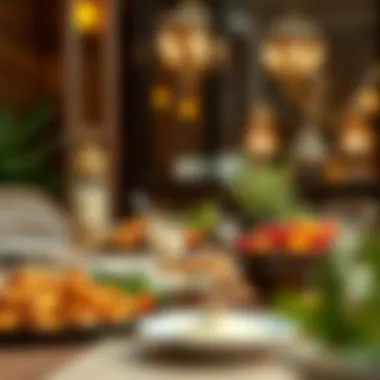Understanding Iftar: Timing and Cultural Significance


Intro
In Dubai, the holy month of Ramadan carries significant weight, especially during iftar, the daily breaking of the fast. This time is not merely about food, but it serves as a pause for reflection, prayer, and connection among family and friends. The act of gathering together as the sun goes down creates an atmosphere that artists and poets have long tried to capture. It’s a moment that blends spiritual fulfillment with community bonding, a time when the aroma of dishes wafts through neighborhoods, calling families to share in the bounty.
From the bustling streets to the quiet corners of homes, the anticipation builds as the day progresses. This article digs deeper into the timing of iftar in Dubai, exploring the various factors that govern when families can sit down to eat. One must consider not just the astronomical calculations but also cultural practices, local customs, and even the role of technology in determining the precise moment to break the fast. These elements collectively form a tapestry that illustrates the famed iftar experience and its underlying significance during Ramadan.
By shedding light on these factors, the article aims to provide valuable insights for both locals and visitors. A deeper understanding of iftar reveals more than just a schedule; it showcases the rich traditions and the cultural heartbeat of Dubai during this holy month.
Prologue to Iftar in Ramadan
The act of iftar holds a prominent place in the observance of Ramadan, a month often recognized for its emphasis on reflection, faith, and community. Understanding iftar requires diving into aspects that reveal its profound significance, beautifully entwined with spiritual rituals and socioeconomic traditions. This article aims to illuminate the nuances of iftar, particularly focusing on its meaning, history, and cultural relevance, especially within the vibrant context of Dubai.
The Meaning of Iftar
Iftar, which translates to ‘break of fast,’ is not merely about consuming food after a day of fasting. Instead, it's an event that signifies unity and gratitude among family, friends, and community. As the sun sets and the call to prayer is heard, individuals gather around shared meals, often beginning with dates and water, inspired by the Sunnah of the Prophet Muhammad. This simple yet profound practice sets the tone for a meal drenched in faith and fellowship.
Historical Context of Iftar
Delving into the history of iftar provides insight into its evolution over centuries. Initially established as a response to the revelations during Ramadan, the practice finds its roots in Islamic teachings. Historical texts show that communities would often prepare lavish meals for those who were fasting, emphasizing hospitality towards one's neighbors and the less fortunate. This tradition laid the groundwork for contemporary practices, where sharing and community engagements during iftar are not just encouraged but intrinsic to the event’s spirit.
Cultural Significance of Iftar
The cultural tapestry of iftar is richly woven with local traditions and customs that vary from region to region. In Dubai, for instance, iftar serves as a unique touchpoint where diverse populations converge, offering a multifaceted experience. The blending of various cultures creates an "Iftar tent" phenomenon, characterized by community gatherings featuring foods that celebrate local and international cuisines. Here’s a glimpse into the cultural significance of iftar:
- Community Bonding: Iftar acts as a unifier, strengthening ties among families, neighbors, and even strangers who share in the experience.
- Philanthropy: Many choose to host community iftars, providing meals for those who cannot afford them, reinforcing the Islamic principles of charity and social responsibility.
- Culinary Heritage: Traditional dishes that represent the cultural nuances come alive during iftar, allowing individuals to savor flavors that tell unique stories.
"Iftar is not just a meal; it's a testament to the shared values of community, compassion, and coexistence."
As we progress through this exploration of iftar, the intent is to unravel the layers of timing and its significance, particularly how these elements resonate within the experiences of both locals and visitors in Dubai.
Determining Iftar Timing
The timing of iftar holds great significance during Ramadan as it marks the end of the daily fast. Understanding how iftar timing is determined allows both practitioners and those interested in the cultural aspects of Islam to appreciate the nuances of this sacred practice. Various elements come into play that ensures iftar is respected and enjoyed by everyone involved.
Factors Influencing Iftar Time
Geographical Location
Geographical location plays an essential role in determining iftar time. As the Earth rotates, the sun sets at different times in various places. This creates differences in iftar timings that can be seen even within the same time zone. For instance, in a sprawling city like Dubai, the height of buildings and the surrounding desert landscape can create a visual illusion of when the sun actually sets. Therefore, knowing the exact local sunset time is vital for those observing the fast. In this context, cities close to the equator generally experience short twilights during Ramadhan, which means the sunset happens more quickly and therefore, iftar can be enjoyed sooner than regions further from the equator.


Seasonal Changes
Seasonal changes shift the timing of sunset, which directly impacts when iftar is observed. As Ramadan follows a lunar calendar, its timing rotates through the seasons over the years. This means that sometimes, Ramadan occurs in the long days of summer, where the fast can extend up to 16 hours. Alternatively, during winter months, iftar can coincide with much shorter fasting durations. This cyclical nature necessitates that practitioners remain attentive to their local conditions, ensuring they are aware of when to break their fast. The change in seasons can also affect what food choices are made during iftar, with lighter salads being more popular in summers compared to stews in colder months.
Local Religious Authorities
Local religious authorities provide crucial guidance regarding iftar times. Mosques and Islamic centers typically announce the breaking of the fast based on astronomical calculations and moon sightings—practices steeped in tradition. This community guideline fosters a sense of belonging, as individuals and families gather for iftar at the designated times. However, different interpretations of these guidelines can lead to variations in iftar times between communities or even neighboring mosques. Understanding these local practices allows one to navigate through differing schedules and harmonizes the collective spirit of Ramadan.
Methods to Calculate Iftar Time
Use of Prayer Timetables
Prayer timetables serve as an essential resource for determining the time of iftar. Issued by local mosques or Islamic organizations, these timetables typically comprehensively list prayer times throughout the month, including the iftar time at sunset. While these timetables are uncomplicated to use, discrepancies can arise due to local variations in sunset timing. It is crucial for practitioners to cross-check the timetable against their geographical location to ensure accuracy. You can often find those timetables online for various regions, and that makes them an accessible resource for everyone.
Islamic Apps and Websites
With the advance of technology, Islamic apps and websites provide users with an instant method to determine iftar timing. Through GPS and astronomical data, these digital platforms can offer precise timing tailored to an individual's location. Applications like Muslim Pro and IslamicFinder quickly adapt to changes in time zones and even seasonal shifts, making breaking the fast easy and calculated. However, technology can sometimes lead to dependency. Users must ensure their devices are using accurate data sources, and it’s worth remembering that technology should complement traditional practices, not replace them.
Community Announcements
Community announcements are another important factor in settling iftar times. During Ramadan, many mosques and community centers gather people for iftar, providing communal meals that enhance social bonding. These gatherings often involve public prayer and shared reflection, making them central to the communal experience during Ramadan. Community leaders usually announce iftar times via loudspeakers or social media, ensuring that everyone is on the same page. However, relying solely on announcements may sometimes lead to confusion or discrepancies, particularly when dealing with very large communities.
By examining these factors and methods, one can better appreciate the importance of determining iftar timing, enriching both individual experiences and community practices during Ramadan.
Iftar in Dubai: Specific Considerations
The Importance of Iftar in Dubai
In the context of Ramadan, iftar represents a moment of breaking fast after a day of abstaining from food and drink. In Dubai, this ritual takes on unique significance due to the local customs, diverse population, and vibrant culture. Understanding the local context—how iftar is practiced in this dynamic city—deepens the experience for both residents and visitors. Notably, the enriching traditions that surround iftar serve not only as a spiritual practice but also as a cultural celebration, highlighting unity and community.
Local Variations in Iftar Timing
In Dubai, variations in iftar timing can occur not only based on geographical location but also by season. For expatriates and tourists new to the region, understanding these local nuances is crucial. The timings can be influenced by the position of the sun, which shifts throughout the month of Ramadan, leading to iftar being observed at different times each evening. Mix in some regional differences based on the community’s customs, and it becomes clear that locals take pride in these unique practices.
Popular Iftar Traditions in Dubai
Family Gatherings
Family gatherings during iftar become a key aspect of the overall spirit of Ramadan. It’s not unusual to see homes bustling with relatives and friends, each bringing dishes that reflect their own cultural backgrounds. The act of sharing food transcends mere sustenance; it fosters a sense of belonging. These gatherings are characterized by vibrant conversations, laughter, and stories that bridge generational gaps. The beauty of eating together strengthens familial bonds, turning the act of breaking fast into a cherished memory.
Charitable Practices


Charity plays a significant role during Ramadan, and it is prominently reflected in the practices surrounding iftar. Many individuals choose to prepare extra food to distribute to those in need. This notable characteristic of iftar emphasizes community spirit and empathy. While enjoying the bounties of their gatherings, families often reflect on those who are less fortunate. This charitable practice reinforces the notion that Ramadan is not just about personal sacrifice, but also about uplifting others. This dual purpose makes charitable giving before or during iftar a meaningful and popular choice.
Community Iftar Events
Dubai proudly hosts an array of community iftar events, appealing to both locals and visitors. These gatherings often take place in public venues and parks, creating an inclusive atmosphere. A key feature of these events is their accessibility; they cater to large groups, allowing anyone to join, regardless of background. While the large gatherings can be overwhelming for some, the sense of camaraderie and collective spirit is an undeniable advantage. Participants share in a collective experience, enhancing their understanding of cultural practices and values.
**"In this cosmopolitan city, iftar becomes not just a meal but a collective experience defining community and inclusiveness."
These aspects of community iftar events lead to a deeper insight into the cultural identity of Dubai, showcasing how shared meals can knit together a diverse population.
Through examining these specific considerations surrounding iftar in Dubai, readers gain a comprehensive insight into the timings, traditions, and practices that make this daily ritual a distinctive part of the Ramadan experience.
Health Considerations During Iftar
Iftar, the meal that breaks the fast, holds significant importance not just as a religious practice but also in terms of health and well-being. After a day of fasting, when the sun sets, it's crucial to consider what and how we eat to ensure that the body is refueled adequately. Fasting impacts our metabolism and hydration levels, so understanding how to break the fast healthily can offer numerous benefits. Incorporating the right foods and hydration strategies can aid in recovery, enhance energy levels, and maintain overall health throughout Ramadan.
Nutritional Aspects of Iftar
Break the Fast: Recommended Foods
When breaking the fast, it's essential to choose foods that nourish the body effectively. Traditionally, many people start with dates, and for good reason. Dates are rich in natural sugars like glucose, fructose, and sucrose, providing an immediate energy boost. They also pack in potassium, which helps replenish electrolytes lost during the day. The soft texture of dates is easy on the stomach after a long period without food, making them a popular choice.
Incorporating foods that provide a balance is also key. Dishes rich in protein, such as grilled chicken or chickpeas, can sustain energy levels longer. Adding healthy fats, like avocados or nuts, can aid in vitamin absorption and provide essential fatty acids. Seasonal fruits and vegetables not only offer hydration but also vital vitamins and minerals.
Benefits of Recommended Foods:
- Energizing: They provide immediate energy post-fast.
- Nutritional: Rich in essential nutrients for overall health.
- Gentle: Easy to digest after hours of fasting.
However, it’s important not to overindulge. Eating heavy or overly rich foods can cause digestive discomfort after a prolonged fast.
Hydration Strategies
Hydration is another critical consideration during Iftar. Throughout the day, fasting can lead to dehydration, especially in warm climates like Dubai. Rehydrating effectively should begin immediately after the fast is broken. Water is essential, but incorporating hydrating foods allows for better fluid balance in the body.
Drinks that are high in electrolytes, such as coconut water or natural juices, can also be advantageous. Herbal teas are another good hydration strategy; they provide warmth and can be soothing to the stomach. Consuming soups can help restore electrolyte levels and provide hydration in a flavorful way.
Advantages of Hydration Strategies:
- Prevents Dehydration: It ensures fluid balance after fasting.
- Restores Electrolytes: Helps in rebalancing vital nutrients.
- Supports Digestion: Warm liquids generally ease the digestive process.
Balanced Meals Post-Fasting


After the fast is broken, it’s beneficial to focus on balanced meals. A well-rounded meal encompasses all macronutrients—carbohydrates, proteins, and fats—playing a significant role in stabilizing blood sugar levels and sustaining energy throughout the evening. Opting for whole grains like brown rice or quinoa in your meals provides fiber and energy that release slowly, keeping you full longer.
Integrating plenty of colorful vegetables not only enhances meals visually but also maximizes nutrient intake. Consider a mix of roasted vegetables or a fresh salad. Pairing these with protein sources amplifies muscle recovery and promotes overall wellbeing.
Key Features of Balanced Meals:
- Sustaining: They keep energy levels consistent throughout the night.
- Nutrient-Dense: These meals cover a wide range of dietary needs.
- Diverse: You can mix and match ingredients to enhance flavors.
However, maintaining moderation is crucial. Eating a balanced meal exits the realm of health benefits if overconsumption occurs, leading to an uneasy feeling in the stomach.
Understanding Hunger and Fasting
This section dives into the physiological aspects of hunger during fasting. After a day without food, the body undergoes various changes that affect hunger signals. Understanding these signals can help manage them better during Ramadan and avoid overeating when breaking the fast. Acknowledging how the body reacts to food after fasting fosters greater awareness about healthy eating choices.
By emphasizing proper nourishment and hydration, the journey through fasting during Ramadan can be both fulfilling and health-conscious. Balancing cultural practices with nutritional wisdom allows individuals to enjoy Iftar while caring for their wellbeing.
End
Reflecting on the significance of iftar reveals its multifaceted nature, deeply woven into the fabric of Ramadan and the lives of those who observe it. At its core, iftar is not merely a meal; it represents a time for unity and reflection. Breaking fast each day signals the end of a day filled with spiritual growth, perseverance, and self-discipline. This process fosters a sense of community, encouraging people to come together to share not only food but also stories, experiences, and emotions.
During this holy month, iftar becomes a peaceful respite for families and friends. Preparing diverse dishes for breaking fast can lead to delightful culinary explorations, showcasing unique cultural fusions. One might find traditional lentil soup served alongside freshly baked bread or dates, not just as a staple but as a cherished symbol of nourishment after a long day of fasting.
The cultural weight of iftar extends beyond individual families; it draws attention to communal gatherings. Cities like Dubai pulse with an energy that is palpable at sunset when people rush to open their fasts in shared spaces. Observing iftar together instills values of compassion and generosity, reinforcing the sense of belonging within neighborhoods. It prompts individuals to think of those less fortunate, often inspiring many to donate to charities or organize community meals.
The significance of iftar, therefore, is not just about the act of eating; it embodies reflection and gratitude. Each meal shared during this time is a reminder of life's blessings and the importance of togetherness in fostering both community spirit and personal growth.
Reflecting on the Importance of Iftar
Iftar holds a vital role in the spiritual and physical rhythm of Ramadan. As the sun dips below the horizon, people anticipate the moment their fast permits them to eat, almost ritualistically tearing into dates or sips of water before enjoying lavish meals. This timing is steeped in tradition—a practice that has transcended generations, symbolizing the culmination of a day's worth of dedication to spiritual endeavors.
At its essence, iftar serves as a platform for strengthening bonds among family members and friends. The essence of breaking bread together is highlighted during these gatherings—whether it’s with loved ones at home or with strangers at community events. This shared experience fosters a strong sense of belonging and reinforces the central tenets of compassion and unity that are at the core of Ramadan.
"Iftar isn’t just about food; it’s about reframing perspectives, mending relationships, and nurturing our souls".
Furthermore, the culinary traditions that arise during iftar help perpetuate cultural heritage. Each dish tells a story, and the flavors connect individuals not only within their communities but also with their ancestors, preserving legacies through food.
The Role of Community in Observing Iftar
The communal aspect of iftar acts as a cornerstone for social cohesion during Ramadan. In a fast-paced world, the evening meal brings together both families and neighbors, creating an atmosphere where relationships are rekindled, and new ones are forged. Iftar tables overflow, often reflecting a medley of cultural influences converging in one setting, allowing for unique sharing of customs and culinary delights.
Additionally, local mosques frequently organize community iftars. This fosters inclusivity, welcoming both Muslims and non-Muslims to partake in the meal and learn about Ramadan's significance. Such occasions serve to break down barriers and misconceptions, helping to build bridges between diverse populations.
The role of local businesses during this time cannot be understated either. Restaurants and cafes often have iftar specials, creating shared spaces where people can connect through food and conversation, contributing to the local economy as well.
Through joint efforts in organizing meals and outreach initiatives, communities reinforce principles of generosity and service. Volunteer-driven food distribution programs during Ramadan thrive, providing sustenance to those less fortunate. Community members may band together to prepare meals for the needy, instilling a powerful sense of purpose and gratitude in the act of giving. In this way, iftar becomes a conduit for fostering empathy and social responsibility while enhancing community ties.
In summary, the communal experience during iftar serves to elevate its significance beyond a mere meal, embedding a deeper connection to both faith and society. The ability to come together fosters a renewed sense of purpose, ensuring that the spirit of Ramadan continues to resonate long after the last date is eaten.













